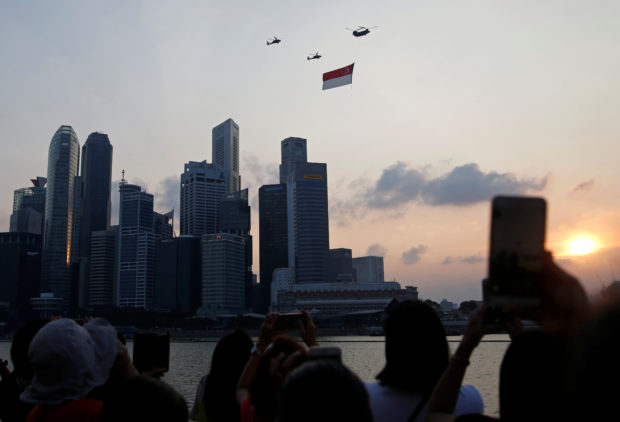Singapore’s main opposition party seeks changes to foreign interference law

People take photos as helicopters fly past with a Singapore flag during the 54th National Day Parade in Singapore August 9, 2019. REUTERS FILE PHOTO
SINGAPORE — Singapore’s main opposition, The Workers’ Party, has called for changes to be made to a draft foreign interference law, citing a need for more transparency, after experts and rights groups also raised concerns about the law’s broad provisions.
The government this month proposed the legislation to tackle foreign interference with powers that include compelling entities such as internet, social media service providers and those who run websites to disclose user information, block content and remove applications.
“While The Workers’ Party believes in the legitimate need to counter malign acts of foreign interference, we disagree with the current form of the Bill in achieving the said objective,” the party said in a statement late on Wednesday.
Singapore, a small and open city-state, says it is vulnerable to foreign meddling. But some experts and rights groups have raised concerns over the proposed law’s broad provisions and limitations on judicial review.
The Workers’ Party said its suggested amendments will result in oversight of executive action by the judiciary and a more precise scoping of executive powers to significantly lower the likelihood of abuse of power.
Article continues after this advertisementThe proposed changes will provide: “Greater clarity and transparency on the identities of the entities and individuals against whom, and reasons for which, any directive, order or decision under this Bill is made.”
Article continues after this advertisementThe ministry of home affairs has said the law would not apply to Singaporeans expressing political views, unless they were agents of a foreign entity.
Neither would it apply to foreign individuals or foreign publications “reporting or commenting on Singapore politics, in an open, transparent and attributable way”, even if critical of Singapore or its government.
The ministry said on Wednesday the proposals by The Workers’ Party would be discussed in parliament next week.
The legislation is likely to be passed due to the ruling People’s Action Party’s parliamentary majority.